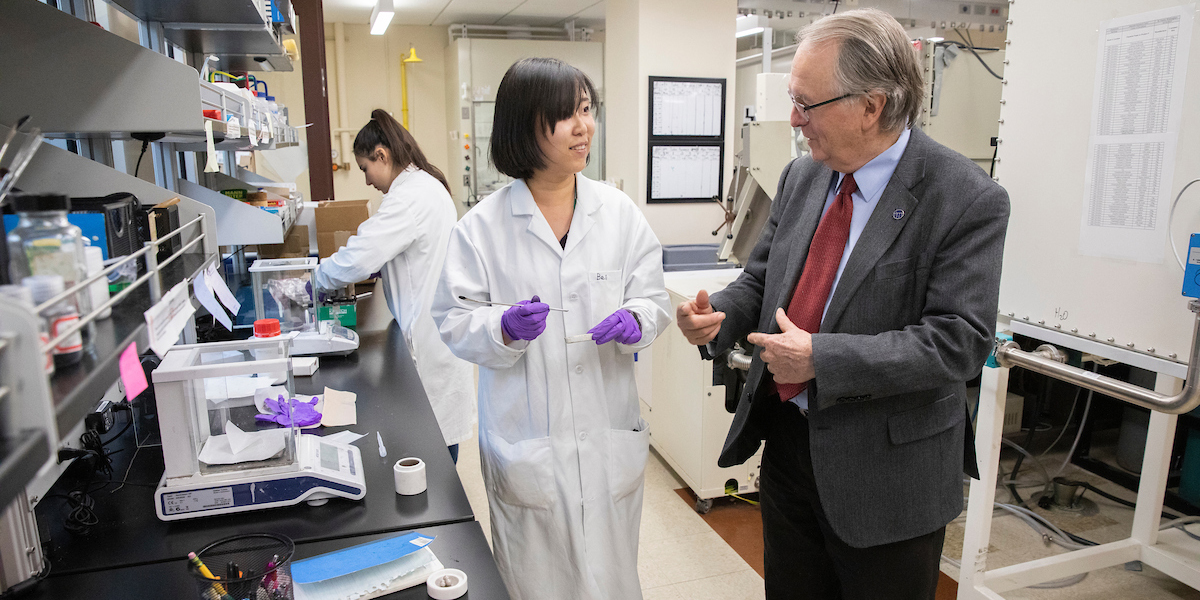Binghamton researchers among top 2% in the world
31 faculty researchers across several disciplines are tops in their fields

More than 30 Binghamton University researchers have been honored for their work by a Stanford University study that looks at the impact of scientists worldwide.
The recently released ranking has identified 31 current faculty who are among the top 2% of all researchers in the world in their fields in 2021.
The Stanford research, published annually, creates a database of the 100,000 top-cited scientists across 22 scientific fields and 174 subfields. This results in rankings for more than 195,000 top scientists.
To collate the rankings, the authors of the Stanford study analyze the work of more than 6 million scientists worldwide and rank them based on their career-long or single-year output (as of 2021) within their field of study. The data includes standardized information on the number of publications and various citation metrics that measure the impact of a researcher’s work.
According to the study, Binghamton University’s most influential scientist is Distinguished Professor of Chemistry M. Stanley Whittingham, who won the Nobel Prize in Chemistry for his development of lithium-ion batteries. Whittingham’s work inspired the New Energy New York project, which was awarded more than $113 million last year to establish a national hub for battery technology innovation in upstate New York.
“Binghamton is continuing to build its research reputation on a national and international level. Knowing how many of our researchers are known at this level is gratifying and further supports our designation by the Carnegie Classification of Institutions of Higher Education as one of only 146 elite schools in the U.S. with very high research activity,” said President Harvey Stenger.
“It’s encouraging to see that this group of Binghamton scholars includes people from such a wide variety of departments as well as early-career researchers who have joined our faculty during the past decade or so,” said Bahgat Sammakia, vice president for research. “Many of these experts do work that addresses vital challenges in our society, from mental health to information security and from leadership to batteries. Our campus’ research portfolio continues to mature, and lists like this reveal Binghamton’s significant contributions to many disciplines.”
“This study underscores that the research conducted at Binghamton is of the highest caliber, as our faculty make breakthroughs and bring their knowledge across multiple disciplines to the fore, addressing societal needs and quality of life,” said Donald Hall, executive vice president for academic affairs and provost.
Here are Binghamton’s top researchers, according to the study:
- Jeremy Blackburn (Watson College/Computer Science)
- Laura Bronstein (College of Community and Public Affairs/Social Work)
- Yu Chen (Watson/Electrical and Computer Engineering)
- Seokheun Choi (Watson/ECE)
- David G. Davies (Harpur College/Biological Sciences)
- Jiye Fang (Harpur/Chemistry)
- Jessica Fridrich (Watson/ECE)
- Brandon E. Gibb (Harpur/Psychology)
- Yetrib Hathout (Pharmacy/Pharmaceutical Sciences)
- Eric P. Hoffman (Pharmacy/Pharmaceutical Sciences)
- J. David Jentsch (Harpur/Psychology)
- Subal C. Kumbhakar (Harpur/Economics)
- Alistair J. Lees (Harpur/Chemistry)
- Mark F. Lenzenweger (Harpur/Psychology)
- Tim K. Lowenstein (Harpur/Geological Sciences)
- Jason W. Moore (Harpur/Sociology)
- Fuda Ning (Watson/Systems Science and Industrial Engineering)
- Wei Qiang (Harpur/Chemistry)
- Karin Sauer (Harpur/Biological Sciences)
- Hiroki Sayama (Watson/SSIE)
- Detlef M. Smilgies (Harpur/Materials Science and Engineering)
- Cyma Van Petten (Harpur/Psychology)
- M. Stanley Whittingham (Harpur/Chemistry)
- David Sloan Wilson (Harpur/Biological Sciences)
- Francis J. Yammarino (School of Management)
- Lijun Yin (Watson/CS)
- Thomas Zaslavsky (Harpur/Mathematics and Statistics)
- Pu Zhang (Watson/Mechanical Engineering)
- Zhongfei “Mark” Zhang (Watson/CS)
- Guangwen Zhou (Watson/ME)
- Ning Zhou (Watson/ECE)

